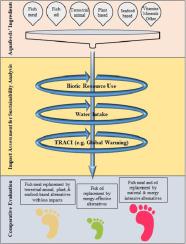Resources, Conservation and Recycling ( IF 11.2 ) Pub Date : 2020-06-15 , DOI: 10.1016/j.resconrec.2020.104849 Ramin Ghamkhar , Andrea Hicks

|
The environmental sustainability of aquaculture food production systems is of critical concern due to its rapid expansion as the fastest growing major food production sector in the world. Among the parameters that contribute to the overall environmental impacts of aquaculture marine-based protein production, aquafeed is identified as an impact hotspot. There is consequently a need to seek more environmentally sustainable aquafeeds to mitigate the adverse environmental impacts associated with aquaculture food production.
The environmental and economic sustainability of aquafeeds can be improved using two main approaches: (a) optimizing finite resources use (e.g. fish meal and fish oil), and (b) mitigating waste generation and emissions. A variety of ingredients have been previously proposed, investigated, and utilized to accomplish these strategies, while maintaining acceptable food production efficiencies. However, comprehensive evaluation of the environmental sustainability of aquafeeds with respect to variable ingredients, both in terms of resource use and waste emission has not been conducted.
In this work, a holistic life cycle impact assessment of twelve practically formulated and utilized aquafeeds has been performed to provide a comparative evaluation of different aquafeed's environmental impacts, considering resource use (biotic resource use, water intake, and fossil fuel depletion) and emission-based impact categories (ozone depletion, global warming, photochemical smog, acidification, eutrophication, carcinogenics, non-carcinogenics, respiratory effects, and ecotoxicity). Results indicate that the investigated fish meal free diets do not, on the whole, result in a significant decrease in environmental impacts with respect to the use of biotic resources. However, if the substituted ingredients would not propose elevated impacts (e.g. blood meal), these diets can potentially lower the overall environmental impacts of aquafeed production mainly with respect to relevant emission-based indicators (e.g. global warming, eutrophication, ecotoxicity). Findings demonstrate that the investigated fish oil free diets can potentially lower the use of biotic resources. However, to prevent burden shifting, strategies to provide nutrient-rich oils with minimal energy requirement need to be undertaken.
中文翻译:

水产饲料生产的环境影响比较评估:饲草鱼粉和无油饲料对可持续性的影响
水产养殖食品生产系统的环境可持续性因其作为世界上增长最快的主要食品生产部门的迅速发展而倍受关注。在影响水产养殖海洋蛋白质生产的整体环境影响的参数中,水产饲料被确定为影响热点。因此,需要寻求更具环境可持续性的水产饲料,以减轻与水产养殖食品生产相关的不利环境影响。
可以使用两种主要方法来改善水产饲料的环境和经济可持续性:(a)优化有限的资源使用(例如鱼粉和鱼油),以及(b)减少废物的产生和排放。先前已经提出,研究并利用了多种成分来完成这些策略,同时又保持了可接受的食品生产效率。但是,尚未对水产饲料在资源利用和废物排放方面对各种成分的环境可持续性进行全面评估。
在这项工作中,我们对12种实际配制和使用的水产饲料进行了全生命周期影响评估,以考虑到资源利用(生物资源利用,水摄入和化石燃料的消耗)和排放量,对不同水产饲料对环境的影响进行了比较评估。基于影响的类别(臭氧消耗,全球变暖,光化学烟雾,酸化,富营养化,致癌物,非致癌物,呼吸作用和生态毒性)。结果表明,总体而言,所研究的无鱼粉饮食在使用生物资源方面不会导致对环境的影响显着降低。但是,如果替代成分不会产生较高的影响(例如血粉),这些饮食可能潜在地降低水产饲料生产对环境的总体影响,主要是在基于排放的相关指标(例如全球变暖,富营养化,生态毒性)方面。研究结果表明,所研究的无鱼油饮食可以降低生物资源的使用。然而,为了防止负担转移,需要采取策略以最少的能量需求提供富含营养的油。











































 京公网安备 11010802027423号
京公网安备 11010802027423号